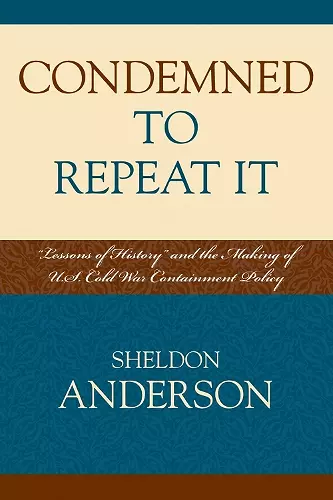Condemned to Repeat It
'Lessons of History' and the Making of U.S. Cold War Containment Policy
Format:Hardback
Publisher:Lexington Books
Published:7th Dec '07
Currently unavailable, and unfortunately no date known when it will be back
This hardback is available in another edition too:
- Paperback£45.00(9780739117446)

Foreign policymakers frequently invoke historical analogies to make and justify decisions in the belief that history teaches particular lessons. Yet historians and philosophers are not so sure. Arthur Schlesinger once wrote that, "Santayana's aphorism must be reversed; too often it is those who can remember the past who are condemned to repeat it." Condemned to Repeat It addresses six historical myths that underwrote U.S. containment policy during the Cold War. The collapse of the Soviet empire seemed to confirm the wisdom of U.S. containment policy and these "lessons of history" as universal truths that still influence U.S. foreign policy thinking today. 1) A European states system based on realism, balance-of-power, raison d'etat, and great power diplomacy did not keep a 'long peace' from 1815 to 1914. 2) The punitive Versailles Treaty with Germany did not cause the rise of Adolf Hitler and World War Two. 3) Erroneous analogies to Neville Chamberlain's failed attempt to avert war at Munich in 1938 worked its way into virtually every debate on the use of force to stop communist aggression during the Cold War. 4) Franklin Roosevelt did not "give away" Eastern Europe to Stalin at the Yalta Conference in 1945. The conventional version of Yalta as a deal to divide Europe is fictional. 5) U.S. containment policy did not create a stable bi-polar world, and like the nineteenth-century balance-of-power system, preserve another "long peace" for forty-five years after World War Two. 6) Ronald Reagan's military build-up and ideological crusade against the Soviet Union did not cause the fall of communism in 1989. Mikhail Gorbachev gave up the Soviet Empire. The Reagan 'victory school' version of the end of the Cold War has given American leaders the dubious belief that the United States alone possesses the power to create a liberal democratic, free market world order. Condemned to Repeat It appeals to anyone with an interest in the legacy of the Cold War, including undergraduate students.
It is a balanced analysis that puts U.S. foreign policy during the Cold War in perspective. Most useful to students and scholars interested in U.S. foreign policy, and for philosophical discussions that focus on how history can be used to guide policy makers in the 21st century. Recommended. * CHOICE, November 2008 *
This important book demonstrates how politicians and diplomats in the post Second World War era used and abused historical analogies?about the Munich and Yalta conferences, the Vietnam War, and President Reagan's arms build up?to promote cold war policiesthat did more to spur conflict than to advance a constructive containment policy. Current and future policymakers would be well served to read this incisive work about the so-called 'lessons of history' so that they might avoid condemning their nation and fellow citizens to perpetual conflicts that serve no vital national interests. -- Arnold A. Offner, Cornelia F. Hugel Professor of History, Lafayette College
This important book demonstrates how politicians and diplomats in the post Second World War era used and abused historical analogies—about the Munich and Yalta conferences, the Vietnam War, and President Reagan's arms build up—to promote cold war policies that did more to spur conflict than to advance a constructive containment policy. "Current and future policymakers would be well served to read this incisive work about the so-called 'lessons of history' so that they might avoid condemning their nation and fellow citizens to perpetual conflicts that serve no vital national interests." -- Arnold A. Offner, Cornelia F. Hugel Professor of History, Lafayette College
ISBN: 9780739117439
Dimensions: 242mm x 163mm x 22mm
Weight: 562g
276 pages